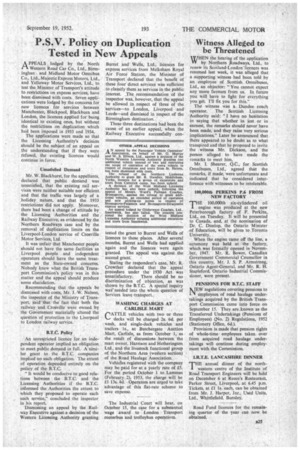P.S.V. Policy on Duplication Tested in New Appeals
Page 59

If you've noticed an error in this article please click here to report it so we can fix it.
APPEALS lodged by the North Western Road Car Co., Ltd., Birminghan . and Midland Motor Omnibus Co., Ltd., Majestic Express Motors, Ltd-, and Yelloway Motor Services, Ltd., to test the Minister of Transport's attitude to restrictions on express services, have been dismissed with costs. Seven appli cations were lodged by the concerns for new licences for services between Manchester, Blackpool, Blackburn and London, the licences applied for being identical to existing ones, but without the restrictions on duplication which had been imposed in 1933 and 1934.
The applications were made so that the Licensing Authority's decision should be the subject of an appeal on the understanding that if they were refused, the existing licences would continue in force.
Unsatisfied Demand Mr. W. Blackhurst, for the appellants, declared that public demand was unsatisfied, that the existing rail services were neither suitable nor efficient and that the traffic was largely of a holiday nature, and that the 1933 restrictions did not apply. Moreover, there had been a change of attitude by the Licensing Authorities and the Railway Executive, as evidenced by the Northern Roadways case and by the removal of duplication limits on the Liverpool-London service of Crosville Motor Services, Ltd.
It was unfair that Manchester people should not have the same facilities as , Liverpool people and indeoendent operators should have the same treatment as the State-owned concerns. Nobody knew what the British Transport Commission's policy was in this matter and the appeal should produce some elucidation.
Recommending that the appeals be dismissed with costs, Mr. J. W. Nelson, the inspector of the Ministry of Transport, said that the fact that both the railWay and Crosville were owned by the Government materially altered the question of protection to the Liverpool to London railway service.
B.T.C. Policy An unrestricted licence for an independent operator implied an obligation to meet public demand in full. A similar grant to the B.T.C. companies implied no such obligation. The extent of operation depended entirely on the policy of the B.T.C.
"It would be conducive to good relations between the B.T.C. and the Licensing Authorities if the B.T.C. informed the Authorities the extent to which they proposed to operate each such service," concluded the inspector in his report.
Dismissing an appeal by the Railway Executive against a decision of the Western Licensing Authority granting Burret and Wells, Ltd., licences for express services from Melksham Royal Air Force Station, the Minister of Transport declared that the benefit of these four direct services was sufficient to classify them as services in the public interest. The recommendation of the inspector was, however, that the appeal be allowed in respect of three of the services—to London, Liverpool and Leeds—and dismissed in respect of the Birmingham destination. .
These three destinations had been the cause of an earlier appeal, when the Railway Executive successfully con tested the grant to Burret and Wells of licences to these places. After several months, Burret and Wells had applied again and the licences were again granted. The appeal was against the second grant.
Stating the respondent's case, Mr. R. Crowther declared that the appeal procedure under the 1930 Act was
unsatisfactory. There should be no discrimination of objection, as was shown by the B.T.C. A special inquiry was-needed into the whole question of Services leave transport., WASHING CHARGES AT CARLISLE MART CATTLE vehicles with two or three decks will be charged 2s. 6d. per wash, and single-deck vehicles and trailers Is., at Butchergate Auction Mart, Carlisle, as from October 1, as the result of discussions between the mart owner, Harrison and Hetherington Ltd., and the livestock functional group of the Northern Area (western section) of the Road. Haulage Association. Vehicles registered with the company may be paid for at a yearly rate of £5. For the period October 1 to Lammas (February 2), 1953, the charge will be El 13s. 4d. Operators are urged to take advantage of this flat-rate scheme to save expense.
The Industrial Court will hear, on October 15, the case for a substantial wage award to London Transport motorbus and trolleybus operatives.




































































































































































